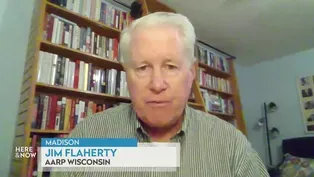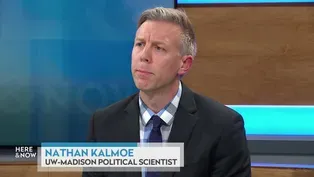Here and Now
Medicaid and Pay for Workers with Developmental Disabilities
Clip: Season 2300 Episode 2315 | 6m 14sVideo has Closed Captions
Fear of losing Medicaid is a factor in debates over wages for workers with disabilities.
Fear of losing Medicaid benefits is a factor in debates over law allowing certain workers with disabilities to be paid lower than minimum wage — advocates urge Wisconsin lawmakers to pursue expansion.
Here and Now
Medicaid and Pay for Workers with Developmental Disabilities
Clip: Season 2300 Episode 2315 | 6m 14sVideo has Closed Captions
Fear of losing Medicaid benefits is a factor in debates over law allowing certain workers with disabilities to be paid lower than minimum wage — advocates urge Wisconsin lawmakers to pursue expansion.
How to Watch Here and Now
Here and Now is available to stream on pbs.org and the free PBS App, available on iPhone, Apple TV, Android TV, Android smartphones, Amazon Fire TV, Amazon Fire Tablet, Roku, Samsung Smart TV, and Vizio.
Providing Support for PBS.org
Learn Moreabout PBS online sponsorship>> All right.
>> Very interesting.
Nathan Kalmoe, thank you so much.
>> Thanks so much for having me.
>> For years, the debate to expand Medicaid in Wisconsin has been shut down by Republicans refusing to consider it, even as a new report from the Wisconsin policy Forum says it could save the state $1.7 billion.
1 population that Medicaid serves, but often feels left out of the conversation.
Are people with disabilities, many of whom are pitted between earning a fair wage and keeping their Medicaid benefits.
In a collaboration with Wisconsin Public Radio's “America Amplified” project, here and Now's, Aditi Debnath is reporting on questions voters are asking this election.
This is the third story in that series.
>> This is part of their day.
This is part of their routine.
They enjoy that paycheck.
At the end of every two weeks, Laura Paepke runs a job skills building program for people with developmental disabilities.
We are there day service provider.
So if there are days that there is not work available, we'll do some vocational workshops.
>> Paepke program called T industries, is one of 49 employers in the state with a special certification known as 14 C. It allows her to pay workers with disabilities based on their productivity, even if that comes out to less than the state minimum wage of 725 an hour.
That pay arrangement, however, doesn't sit well with advocates like Beth Swedeen, executive director of the Wisconsin Board for people with Developmental Disabilities.
>> Our position is that people with disabilities should be working at similar jobs to other people based on their interests, and that they should get compensated at market rates.
>> Paying workers with disabilities less than the minimum wage has induced controversy across the country, causing 13 states to eliminate those kinds of private employers altogether.
>> So my brother's name is Matthew, and he is 46 years old.
He's been at T industries for at least 20 years.
>> Kristina Miller lives with her brother Matthew, who enjoys his work at T. She says that even if he earned minimum wage, he wouldn't be able to get ahead.
amount of money, his SSI benefits automatically get reduced and he then is also subject to losing his Medicaid benefits.
>> She's found the debate over 14 C employment programs for disabled workers to be frustrating, since everything has started with trying to eliminate the 14 C certification.
organizations putting more restrictions managed care organizations are the decision makers for how Medicaid dollars are spent, which includes funding for T industries.
>> In 2014, federal regulations forced Wisconsin to increase the age requirement to participate in 14 C programs from 18 to 25.
This change was aimed at getting younger adults to seek standard jobs before turning to sheltered workshop employment.
>> Like any complex social problem, there's no silver bullet solution, Swedeen says.
>> Medicaid expansion could improve these programs.
>> That money could be invested back into wages, benefits and other supports.
>> This would eliminate one of Kristina Miller's main reasons for favoring Subminimum wage work for her brother.
Fear of losing his Medicaid benefits.
>> We should be fighting for there for no caps on their Social Security benefits, you know, for not having caps for their Medicaid benefits so they can get these community jobs and work and not worry about losing their benefits and having, you know, those cut or reduced because now they're making too much money.
>> That's not true.
There's a lot of benefits counseling out there that can help people understand how much they can earn and still retain their health insurance and other public benefits.
mean added supports for personal care and employment, skills for people with disabilities, and not having to choose between fair wages and disability benefits.
learning how to, you know, manage money or learn about cell phone etiquette or anything.
>> Mary Swifka is Noah's mother.
He has Down's syndrome.
>> The idea is to give him the independence that he deserves.
>> Swifka is an advocate for Medicaid expansion, but she feels people with disabilities are often left out of the conversation at the state level.
>> What I've heard from state legislative leaders, they think that all Medicaid does is provide medical insurance for people who are lower income and frail elderly, but Medicaid does so much more than that.
Medicaid dollars pay for Noah to be independent in his community.
They pay for job coaching, Medicaid pays for people with disabilities who have to have at home care.
>> Swedeen says that regular jobs are most valuable for people with developmental disabilities, both in wages and experiences, but that she recognizes the value in sheltered workshop programs and Medicaid expansion would give people that choice.
>> There's still a place for some people who are older, maybe, or have have worked or have gotten those vocational supports for many years where we're not advocating the erasure of providers, but we are advocating that it's important for people, whenever possible, to get their supports in the community and at a fair market wage.
>> Paepke says a statewide elimination of programs like T would be difficult for her clients.
vocational services, we have day activities, and that's really what the clients should be, their choice to decide not, you know, a government entity making
Baldwin, Hovde and Top Issues in Wisconsin's US Senate Race
Video has Closed Captions
Tammy Baldwin, Eric Hovde hold divergent positions on the economy, immigration, abortion. (6m 31s)
Here & Now opening for October 11, 2024
Video has Closed Captions
The introduction to the October 11, 2024 episode of Here & Now. (1m 23s)
Jim Flaherty on Older Wisconsin Voters in the 2024 Election
Video has Closed Captions
Jim Flaherty on the enthusiasm of voters over the age of 50 for the 2024 election. (6m 2s)
Nathan Kalmoe on hateful rhetoric and political violence
Video has Closed Captions
Nathan Kalmoe examines growing hateful rhetoric, political violence ahead of the election. (5m 56s)
Providing Support for PBS.org
Learn Moreabout PBS online sponsorship














